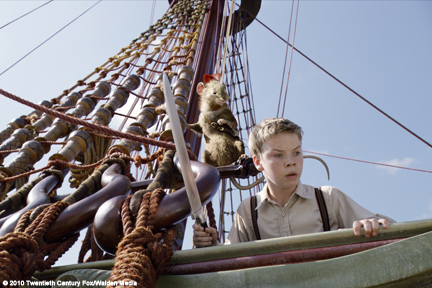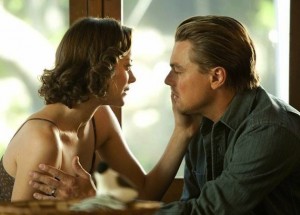My review of The Chronicles of Narnia: The Voyage of the Dawn Treader movie has been posted at the Journal of Religion and Film (accessible through this link).
My review references the original script, part of which was leaked to the public in 2008, causing much outrage among Lewis enthusiasts. Details about that script and its similarities and differences from the final product can be found here. Essentially, they tried to merge the story of Voyage with The Silver Chair by completely inventing a new narrative for the former, as director Michael Apted explained:
It took us nearly two years to figure it [how to make Voyage into a viable movie narrative] out. The way we did it was to look at the next book and see where that began and where ‘Dawn Treader’ ended and to realise there was a complete chunk of the story missing. ‘The Silver Chair’ is about Eustace going down underground to where captured Narnians have been preparing to attack Narnia and the witch was down there organising all this and Caspian was an old man. So what we decided to do was to take that piece of narrative, i.e. that Narnians had been kidnapped and taken somewhere no one knows, and use that as the driving force.
For what it’s worth, I’m convinced that someone within the Lewis Trust intentionally leaked the script, convinced that it would be disastrous to put out a movie so thoroughly different from the book. The leak ended up delaying the film by about a year as they had to make a lot of changes (the public reasons given were “the challenging schedules for [its] young actors,” but I don’t buy it) before shooting. The edited script ended up a compromise between the leaked script and a more faithful attempt at rendering Lewis’ book on screen.

Although the film was more watchable than the first two installments of the series (mainly because the children weren’t constantly bickering or wishing they were in England the whole time like in the prior two movies—I still can’t believe the character assassination performed on Peter in those films), I still can’t believe Walden Media was unable to hire a director better suited for the job. I’m convinced this is ultimately the biggest thing separating the Chronicles film adaptations from the spectacularly well-executed Lord of the Rings trilogy: producer Saul Zaentz went out and hired a largely unknown director (having previously directed such blockbusters as The Frighteners and Heavenly Creatures) who happened to be a Tolkien fanboy (who had all but begged to be given the opportunity) to direct these massive-budget films. There were reports of on-set debates between Jackson and actors like Ian McKellen, who was known to pull out the books to cite Tolkien chapter-and-verse, about whether this or that scene or line of dialogue was faithful to the book. The effort was made to adapt Tolkien’s world and story to the silver screen as faithfully as possible. Given the richness and detail of Tolkien’s constructed world, this seemed an impossible task at the time, but it was a staggering (though certainly not perfect) success.
Again, the key to the LOTR films’ success was not their impressive CGI, not even the quality of the acting, but the commitment to faithfully represent the books themselves as much as possible. Zaentz took the right approach by hiring someone for whom the project was meaningful, someone who was already invested in the books, who already loved the material, someone who was more interested in representing Tolkien’s world than constructing his own. Contrast that with these comments from Voyage of the Dawn Treader director Michael Apted, discussing the process of making the movie:
When I read it [The Voyage of the Dawn Treader] I was alarmed. I liked very much the story and the tone of it and the colour of it and the imagination of it. (But) it was pretty clear to me that there was no drive to it whatsoever. It felt very episodic. That’s catastrophic in a movie. You’ve got to have a reason in a movie to go from A to B to C especially in a commercial movie. So that was a big problem.
Translation: “Lewis’ story wouldn’t work on screen, so we decided we needed to write our own.” The original (leaked) script shows just how far they ventured in trying to write a wholly new narrative. Even more amazing is that Walden Media hired a director who apparently had not even read the book before coming on the project. This is the biggest mistake a media company can make when trying to adapt a beloved book into a film.
Can you imagine a company hiring someone to direct a Jane Austen novel without that person having ever read the book before being hired? Apted was apparently hired on the basis of his experience with CGI (having directed the Pierce Brosnan Bond film, The World is Not Enough) and his experience with religious/ethical films (Amazing Grace). But the man had no investment in the Chronicles, no fond memories of having read the book that he was trying to represent on screen, no commitment to represent Lewis’ pictures on the screen as faithfully as possible. So instead of getting a faithful adaptation of the narrative crafted by master storyteller C.S. Lewis, we got a middling story by a few screenwriting hacks who tried to improve the master’s story. And we wonder why such projects wind up disappointing?
Walden Media should have hired a director who was aching to direct these beloved stories—I’m sure one is out there, given the Chronicles’ popularity—even if that meant hiring a somewhat unproven or unknown director. Apted is right that the book’s episodic nature makes for a difficult transition to film. But would anyone seriously argue that his task was harder than the task of representing the incredibly episodic and meandering Lord of the Rings story? LOTR is as close to impossible to film as anything could be—but it was successfully done by someone who really loved the books. Walden Media has made an incredibly costly mistake in producing these films by not first seeking out filmmakers who themselves had longed to see Lewis’ work on screen. Instead, the hirelings in charge of these productions have done film-by-the-numbers, with predictable results.
A few other notes
My JRF review also briefly mentioned the film’s attempt to make Lewis more “family friendly” to appeal to the conservative American audience it was targeting. The Wall Street Journal had an excellent article on this point that is well worth the read. Long story short, the films have tried to domesticate Lewis’ stories to make them more attractive to a conservative audience while simultaneously making the films more religiously ambiguous than Lewis’ stories. Instead of getting narratives packed with episodes and symbols with clear Christian underpinnings, these films have focused on “family friendly” fare and ambiguous “faith” and self-esteem lessons. It’s understandable for a movie that wants more than just a Christian audience, but it is worth noting the changes.
One of the biggest changes in this particular film is that (as another reviewer has pointed out) everything that happens seems entirely arbitrary. Eustace seemingly randomly becomes a dragon (as opposed to his outside matching his inside, like in the book), decisions about what to do are made willy-nilly with little to no explanation, and the magical elements of the story seem to have no rationale. Why/how did the Great Evil from the Fifth Element get into Narnia and set up shop as Dark Island? What is the deal with the green mist? Why in the world would putting seven swords on Aslan’s table in the East break Dark Island’s spell? None of this stuff makes any sense. The arbitrary nature of the magic in the movie was (as a friend with whom I watched the film commented) more reminiscent of the world of Harry Potter than that of C.S. Lewis.
Likewise, Eustace is just magically undragoned by Aslan with no baptismal echoes and no explanation that his outward appearance is again being transformed to match his inward conversion. Even worse, the film takes the sting out of Eustace’s becoming dragon. Another reviewer rightly notes the difference: “The book shows Eustace as a loser who is shown mercy. The film shows Eustace as a hero getting his reward.” Reepicheep even tells Eustace, “Extraordinary things only happen to extraordinary people. Maybe it’s a sign?” Seriously? This is the very opposite lesson from the book.
Two other reviews are also worth a look: the Ship of Fools review is excellent, as is that of the National Catholic Register.




2 Comments. Leave new
You might be interested in my review at http://godswordourwordsandtheworld.blogspot.com/2010/12/voyage-of-dawn-treader-losing-grip.html
An interesting review. The original screenwriter actually had Eustace set up to “earn” his being un-dragoned by having him heroically fight the sea-serpent, but Walden Media (and the Lewis Trust) vigorously protested that this misunderstood Christian grace, which doesn’t work that way.
That said, I’m not sure your definition of Pelagianism is especially accurate, though it is a common one for Reformed folks to throw around. Pelagius did not believe that humans could earn their own salvation; rather, the debate was over whether human beings were actually capable of obedience and thereby culpable for their own disobedience. Pelagius believed (in line with the older Greek fathers) that human beings were capable of complete obedience but chose to sin and thereby came to be enslaved by sin (thus needing Christ), whereas Augustine believed that humans were tainted by Original Sin, which was inherited through the sex act. That debate was not about “earning salvation” but primarily about responsibility for sin. Pelagius placed the responsibility for sin upon each individual sinner, while Augustine placed the primary responsibility upon Adam.